In a post-lockdown world, where the risk of COVID-19 hasn't died but life must continue, practising medicine is going to be fraught with risks-both, for practitioners and you, the patient. And, Mumbai's docs are lining up protocols and tech supplement
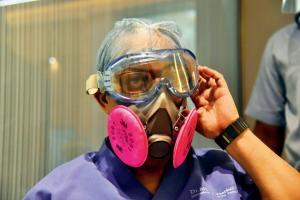
Bandra-based dentist Dr Mukul Dabholkar will sport the HEPA filter respirator mask that removes bacteria, virus, and doesn't cause re-inhalation of exhaled carbon dioxide from the breath. Pic/ Pradeep Dhivar
Even before we open the clinics, we are going to have to spend thousands [on disinfecting the clinic]," says Dr Rose Davies, a periodontist practising at Mulund West.
In a post-lockdown world, where the risk of the novel Coronavirus infection hasn't completely died down, but life must continue, practicing medicine is going to be a task fraught with risks—both, for the practitioner and for the patient. And, already Mumbai's doctors are lining up various protocols and tech supplements that can help keep their spaces free of infection.
ADVERTISEMENT
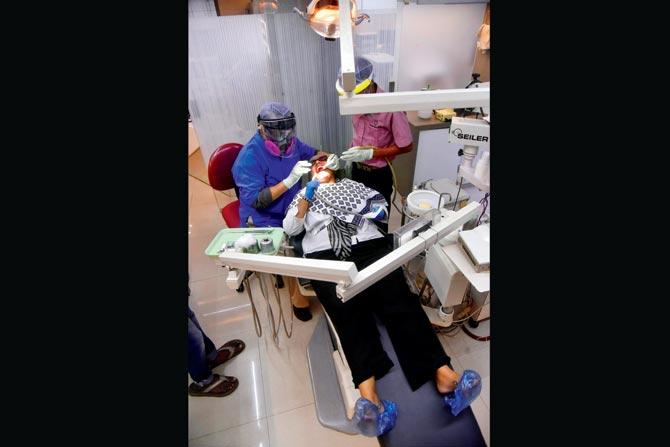
Dr Mukul Dabholkar, Bandra-based dentist, says patients will be asked to use hand sanitisers and hexidene gargles and give their contact history at their clinics.
The first step in the battle begins at the gate itself. Before a patient enters the clinic, a security officer will test their temperature. "Anybody who has fever is being sent to the nearest fever clinic—there's one close by," says Dr Carlton Pereira, a senior ENT specialist, who runs the Worli-based Bosco ENT Nursing Home. He adds that because of the nature of his field, cold/cough/fever were once standard in patients, however those showing these symptoms, typical of COVID-19, are now being directed for testing first.
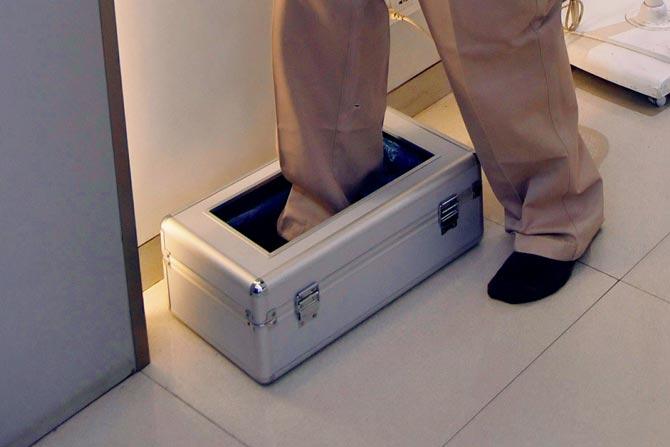
Feet wrapped in plastic
Dentist, Dr Mukul Dabholkar, who runs a practice near Bandra's Mehboob Studios, describes the protocols. He admits there are chances that some may come to the doctor having popped a pill to dodge the temperature check. To ensure that they too, are being accounted for, all patients will be asked questions regarding their travel history, whether they know or have come in contact with anyone who has shown symptoms or tested positive. While the Brihanmumbai Municipal Corporation has issued a form that patients must sign, affirming that they are Coronavirus free, doctors say this form is largely based on checking travel history and thus, no longer a foolproof method. Patients, says Dr Dabholkar, will also be given the pulse oximetre, which checks the level of oxygen in the blood. "If it's anything less than 92 per cent, hesitate to treat the patient and ask them instead to get a clearance from their physician first," he adds. At his clinic, he says, patients will be asked to leave their shoes outside and step with bare feet on a machine that will wrap the feet in plastic covers. This he says, will cost around R7,000. Patients will also be given isopropyl alcohol [hand sanitisers] and hair caps as hair often carries bacteria. "We will advise patients to shave their beards and moustaches, to keep facial hair to a minimum, but not everyone may agree to that," he adds.

Oxygen level checks being done
Before the patient enters the waiting area, they will be given a betadine mouthwash and asked to do a deep gargle with a hexidene mouthwash, which destroys 99.5 per cent of the virus sitting in the upper respiratory tract.
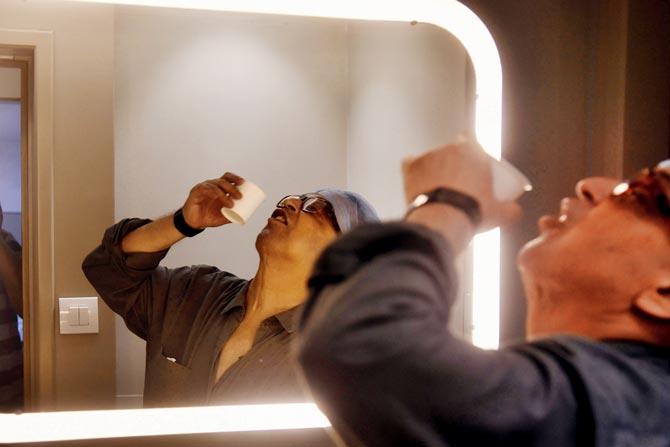
Hexidene gargles
The clinic too, he says, will be swabbed three times a day with disinfecting surface liquid. "Ultrasonic units can be bought to clean the equipment. People have also argued that water for drilling/cleaning the teeth causes bounce back which can lead to infection. So, most [dental] chairs come with high vacuum suction, or you can purchase one separately. This is available for R13,000. There are also chemicals available for flushing the tubings each time it is used on a patient."
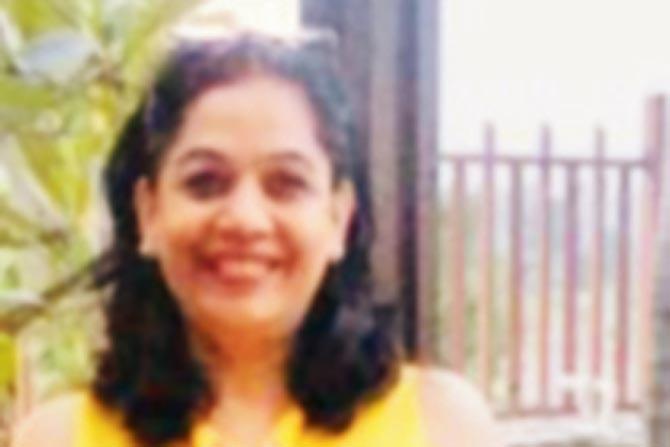
Dr Rose Davies, periodontist
Dr Davies says that while there have been no definitive guidelines, experts on various webinars have suggested not using air conditioners, and if that's not possible, to use HEPA filters. HEPA, or High-Efficiency Particulate Air filters that trap harmful particles such as pollen, dander, dust mites and tobacco smoke.
While the Indian Medical Association has guidelines on treatment and background checks of patients before they enter clinics and advisory on social distancing, there has been no specification on infrastructural changes given that the virus is highly infectious. So, doctors are turning to webinars within the community to address concerns.
Dr Davies says that some of these have even suggested usage of ceiling fans, how the pedestal fan be positioned and that windows be used. "But, where are the windows in Mumbai clinics? Doctors operate from shop spaces that have other shops next to them, or a small gala space. In such a situation, ventilation becomes difficult. I have been operating with the door open."
But, this too, becomes difficult when wearing the Personal Protection Equipment (PPE) kit. Dr Davies, for instance, wears that along with double gloves, a mask and face shield. "With no AC, it becomes claustrophobic. We are still procuring many items. Not everyone has a fogging machine. The air purifier is out of stock and visibility is hampered when using a face shield. We will also have to train our staff in using the equipment."

Dr Carlton Pereira
The new safety measures don't come cheap. A good PPE kit—one that fits well, is of 90–100 GSM—could cost as much as R2,500 per kit per use. The reusable ones, require chemical cleaning, drying and fogging and come at R350 – R500. Dr Pereira says steel tongue depressors have been replaced with usable ones. "And because there are now more in play, it costs more. Some hospitals have transferred this onto consumer bills." The increase of disposables in medical equipment also means increase in medical waste, with red bags piling up inside clinics and occupying space—a different agency comes once a week to pick up material, as this cannot be handed over for regular garbage disposal—it costs around R4,000 per year.
And yet, though costs have been rising for doctors, they will not be able to make it up by packing their schedule with patients. If anything, due to social distancing norms, waiting rooms will wear an empty look. Dr Anjali Malpani, founder director of the Colaba-based Malpani Infertility Clinic says, "There was a time when people would judge a doctor by how crowded his waiting room was. This should hopefully change that." She adds that to cut down the numbers in her waiting room, there will have to be some cuts in appointments. Tele medicine, which they have been practising for years now, will gain priority.
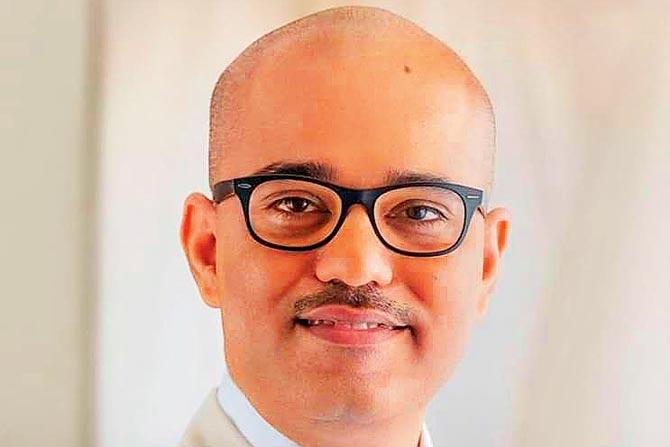
Dr Pranjal Kodkani
Dr Pranjal Kodkani, orthopaedic surgeon specialising in joint preservation, arthroscopy and sports injury, says not many patients are comfortable heading to hospitals, and so will opt for smaller clinics where possible. In addition to spaced out consults, patients will be told to avoid being accompanied by someone else unless absolutely necessary. If someone has arrived late, they will be asked to wait outside until the waiting room gets cleared enough.
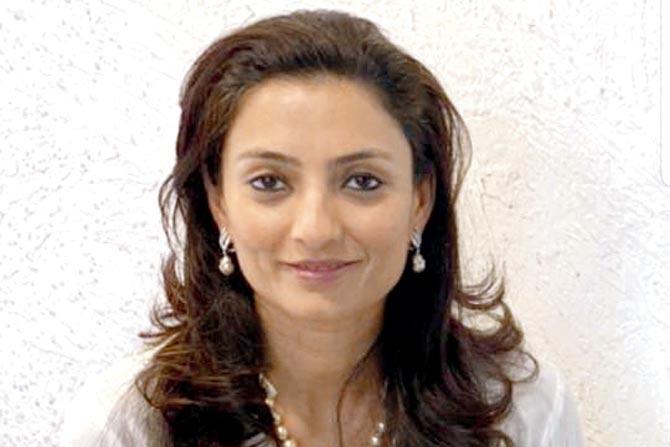
Dr Sheetal Sabharwal
It's similar protocols that are being following by Khar-based obstetrician and gynaecologist Dr Sheetal Sabharwal. She says, relatives are not being allowed to accompany patients during consultations or even minor surgeries. "Since the government is not allowing testing for attendants, we are only allowing the husband to be present at the nursing home during delivery but not in the delivery room. However, in such cases, the husband stays at the nursing home for three days and isn't allowed to step out. No visitors are allowed."
In addition to sanitisers and masks for patients and N-95 masks for doctors, the examination bed is covered with a rexine sheet that is disinfected after every consult. "We have to assume that everyone is a carrier now. Those who are in containement zones are themselves not stepping out. And, while we try our best, sometimes you cannot take all precautions. We had a patient whose COVID-19 test result hasn't come in and she went into labour. She was due for a week later, but what can you do? She needed a C-Section and we did the needful taking all precautions."
Will the increased expenses translate to larger medical bills? For now, the doctors say, no. "At some point, yes. But not now. Right now, the economy is down and this is not the time to charge people money. Of course, it's more difficult for new doctors who've started their careers and have rent to pay for their clinics," says Dr Davies.
Catch up on all the latest Mumbai news, crime news, current affairs, and a complete guide from food to things to do and events across Mumbai. Also download the new mid-day Android and iOS apps to get latest updates.
Mid-Day is now on Telegram. Click here to join our channel (@middayinfomedialtd) and stay updated with the latest news
 Subscribe today by clicking the link and stay updated with the latest news!" Click here!
Subscribe today by clicking the link and stay updated with the latest news!" Click here!







